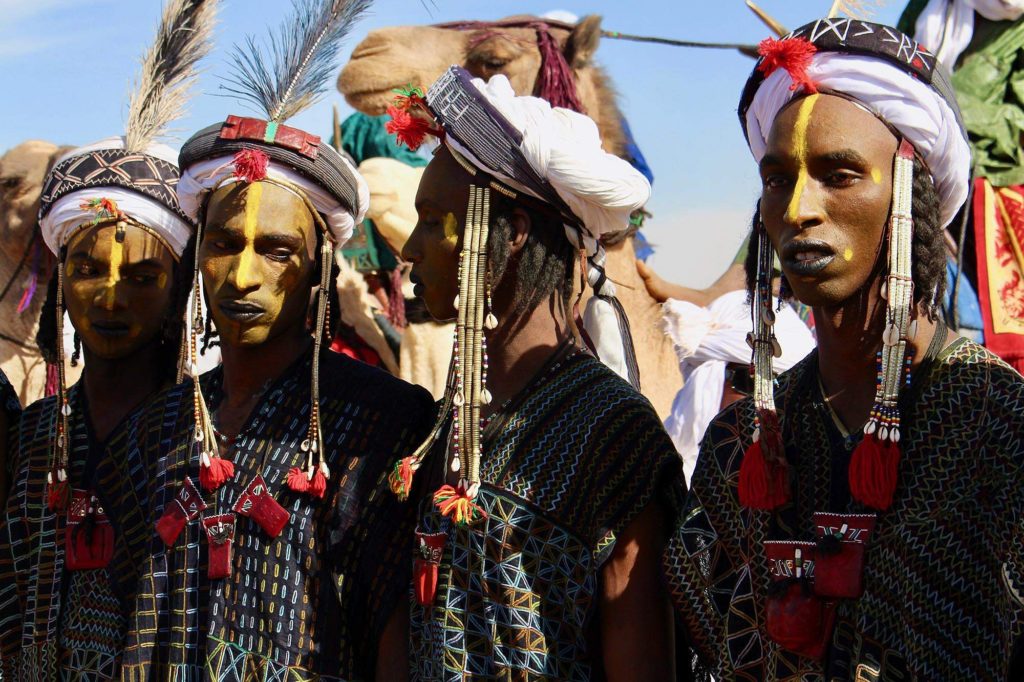The vast expanse of the Sahara Desert, with its golden dunes and endless horizons, has been home to the Tuareg people for centuries. Often referred to as the “Blue People” due to the indigo dye in their traditional clothing, the Tuareg are a nomadic Berber ethnic group, primarily found in the Saharan region encompassing countries like Mali, Niger, Algeria, Libya, Burkina Faso, and Chad. The Tuareg have an ancient and rich cultural heritage that has sustained them through the harsh desert environment, shaping their unique way of life, beliefs, and traditions.
Historical Roots
The history of the Tuareg people dates back thousands of years, with their origins shrouded in mystery. Some believe they are the descendants of the ancient Saharan people who have inhabited the region since prehistoric times. Over the centuries, they have developed a distinct cultural identity, characterized by their nomadic lifestyle, intricate social structure, and deep-rooted traditions.
Nomadic Lifestyle
Central to Tuareg identity is their nomadic lifestyle. The harsh desert environment necessitates constant movement in search of water and pasture for their livestock. Tuareg families travel together in caravans, herding goats, camels, and cattle across the arid terrain. This nomadic existence has not only shaped their social structure but also influenced their customs and traditions.
Social Structure and Traditions
The Tuareg society is organized into matrilineal clans, where lineage and heritage are passed down through the mother’s side. Women play a significant role in Tuareg communities, enjoying more freedom and rights compared to their counterparts in many other cultures. They are involved in economic activities, manage household affairs, and actively participate in decision-making processes.
Traditionally, Tuareg society practices a system of caste, with distinct roles assigned to various social groups. The nobles, known as the Imajaghan, are responsible for leadership and decision-making, while skilled craftsmen, such as metalworkers and leather artisans, contribute to the community’s economic well-being. This intricate social structure has remained a fundamental aspect of Tuareg life, fostering a strong sense of identity and belonging among the people.
Artistry and Craftsmanship
The Tuareg are renowned for their exceptional craftsmanship, producing intricate jewelry, leatherwork, and textiles that reflect their cultural heritage. Silversmithing, in particular, holds a special place in Tuareg artistry. The elaborate designs and geometric patterns adorning their jewelry not only serve as adornments but also carry symbolic meanings, representing aspects of their nomadic lifestyle and spiritual beliefs.
Spirituality and Beliefs
Tuareg spirituality is deeply intertwined with nature and the desert landscape. They practice a form of Islam infused with traditional animistic beliefs, where natural elements like trees, rocks, and water sources are considered sacred. Many Tuareg communities also adhere to a code of ethics known as “Takamat,” emphasizing honor, hospitality, and solidarity among the people. This moral code guides their interactions and relationships, fostering a strong sense of community spirit.
Challenges and Preservation
In recent years, the traditional nomadic way of life of the Tuareg people has faced challenges due to various factors, including climate change, political instability, and modernization. The encroachment of urbanization and restrictions on traditional grazing lands have posed significant threats to their livelihoods and cultural practices.
Efforts are being made by Tuareg communities and international organizations to preserve their unique cultural heritage. Initiatives focusing on education, sustainable development, and the promotion of traditional crafts are helping the Tuareg people adapt to changing circumstances while safeguarding their traditions for future generations.
Conclusion
The Tuareg people, with their resilient spirit and rich cultural heritage, continue to navigate the challenges of the modern world while holding onto the traditions that define their identity. As nomads of the Sahara, they serve as a testament to the strength of human adaptability and the enduring power of ancient customs in shaping the tapestry of our diverse world. Their story reminds us of the importance of preserving and appreciating the cultural diversity that makes our planet a truly remarkable and vibrant place.

